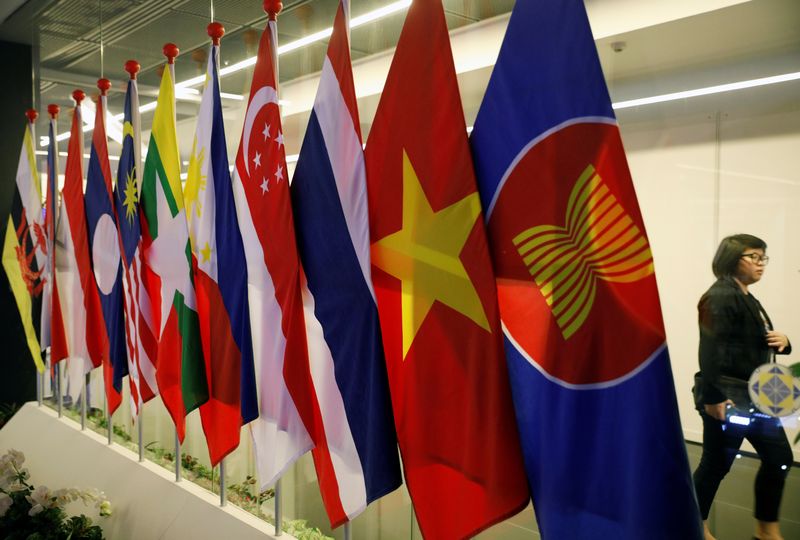By Leika Kihara and Jihoon Lee
INCHEON, South Korea (Reuters) -Asian finance leaders will on Tuesday look for ways to tighten safeguards to address emergency funding needs during pandemics and natural disasters, as global recession fears and volatile financial markets cloud the economic outlook.
The impact of U.S. interest rate increases on the region's capital flows may also be discussed when finance ministers and central bank chiefs of ASEAN+3 - which groups the 10-member Association of Southeast Asian Nations (ASEAN) and Japan, China and South Korea - meet on Tuesday.
Japan, which co-chairs this year's meeting with Indonesia, hopes to discuss strengthening currency swap lines, Finance Minister Shunichi Suzuki told reporters on Friday.
Japan is keen to propose a facility that enhances the use of existing currency swap lines, and allows members to tap funds in emergencies, said three sources with direct knowledge of the matter.
The recent failures of two U.S. banks have alarmed policymakers about vulnerabilities in the global banking system and the possibility of market turbulence as a result of aggressive U.S. interest rate rises.
In a meeting with his Chinese and Japanese counterparts before the ASEAN+3 gathering, South Korean Finance Minister Choo Kyung-ho said cooperation had become more important for Asia and the rest of the world with the global economy at an "inflection point".
"Despite the close economic relationships among China, Japan, and Korea, we have observed a recent slowdown in economic relations, particularly in terms of trade in goods and services," the three ministers said in a statement.
"We recognize the importance of strengthening our economic and trade relations to secure post-pandemic growth, minimize any lasting negative effects, and preparing for future shocks," they said.
The ASEAN+3 group created a network of currency swap lines called the Chiang Mai Initiative Multilateralisation (CMIM) in 2000, after the Asian financial crisis of the late 1990s, and revamped it into a multilateral network in 2010, to help each other forestall or combat sharp capital outflows.
But the swap lines have never been used, not even during the COVID-19 pandemic, leading to calls within the group for the system to be more accessible.
While Asian policymakers stress their countries have sufficient foreign reserves and buffers to fend off another crisis, they may see scope for enhancements to arrangements to combat market upheaval, analysts say.
"The fact CMIM has never been tapped since being created shows countries find it hard to use," said Toru Nishihama, chief emerging market economist at Dai-ichi Life Research Institute.
While it was important to make the CMIM more flexible, countries should also ensure they have strong surveillance in place to avoid moral hazard, he added.

Developing Asia is expected to achieve strong economic growth of 4.8% in 2023, faster than 4.2% growth in 2022 thanks to China's rebound, according to the Asia Development Bank (ADB) projections.
The ASEAN+3 finance leaders, including Suzuki and Bank of Japan (BOJ) Governor Kazuo Ueda, are meeting on the sidelines of the ADB's annual meeting in Incheon in South Korea this week.